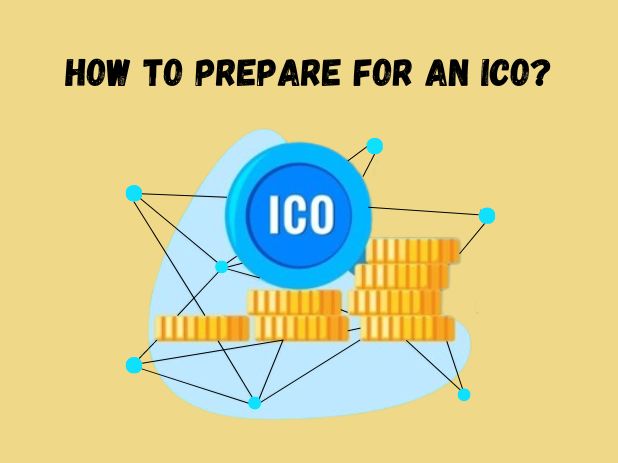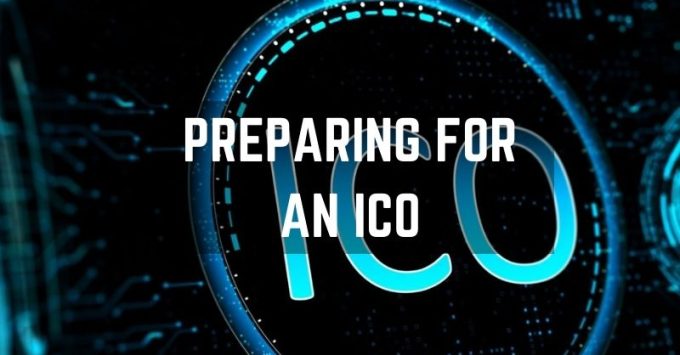ICO stands for Initial Coin Offering. It is a fundraising method used by cryptocurrency and blockchain startups to raise capital for their projects. In the traditional financial world, ICOs are similar in concept to Initial Public Offerings (IPOs). In IPOs, companies sell shares of their stock to the public to raise funds. However, in the case of ICOs, companies issue digital tokens or coins to investors in exchange for cryptocurrency instead of selling shares. So, it is important to know how to prepare for an initial coin offering (ICO).
How ICO Works?
The blockchain project announces its plan to launch an ICO. The project outlines its goals, objectives, and the problem it intends to solve. The project creates a new cryptocurrency token or coin on a blockchain platform that complies with a specific standard, such as ERC-20 for Ethereum-based tokens. These tokens are what investors will purchase during the ICO.
The project sets a date for the ICO and starts selling its tokens to interested investors. Investors participate in the ICO by sending a specific amount of cryptocurrency to the project’s designated wallet address in exchange for the new tokens. The price of tokens varies depending on the timing of the investment or the amount invested.
The funds raised through the ICO are typically used to fund the development of the project, marketing, and other operational expenses.
After the ICO, the new tokens are listed on cryptocurrency exchanges which allows investors to trade them with other cryptocurrencies. This is where the value of the tokens fluctuates based on supply and demand dynamics.

How to Prepare for an ICO?
Preparing for an Initial Coin Offering (ICO) involves several steps to make sure that your cryptocurrency or blockchain project is well-organized and attracts potential investors. Here is a step-by-step guide on how to prepare for an initial coin offering (ICO):
-
Define Your Project:
Clearly define your project’s goals, objectives, and the problem it aims to solve. Develop a whitepaper that outlines your project’s concept, technology, roadmap, team, and tokenomics (details about the token’s distribution, use cases, and economics).
-
Assemble a Strong Team:
Build a skilled and experienced team with expertise in blockchain development, business development, marketing, legal, and compliance. Make sure that there is transparency by providing information about your team members on your website and in your whitepaper.
-
Legal and Regulatory Compliance:
Consult legal experts who specialize in blockchain and cryptocurrency regulations for adherence to relevant laws and regulations in your target markets. Determine whether your ICO qualifies as a security or utility token under local regulations, as this may affect your compliance requirements.
-
Technical Development:
Develop the blockchain technology and smart contracts necessary for your project. Conduct thorough security audits to identify and address vulnerabilities in your code. Make sure that your blockchain structure is scalable and robust.
-
Token Creation:
Create the tokens that will be offered during the ICO. These tokens should comply with industry standards, such as ERC-20 for Ethereum-based tokens, for compatibility with various wallets and exchanges. Establish a clear distribution plan for the tokens including details about token allocation to the team, advisors, early backers, and the public.
-
Marketing and Community Building:
Build a strong online presence through a professionally designed website and active social media channels. Engage with the crypto and blockchain communities through forums, conferences, and meetups. Create marketing materials, including videos, articles, and press releases. Consider launching a pre-ICO marketing campaign to generate interest and attract potential investors.
-
ICO Smart Contract and Wallet:
Develop a secure smart contract for the ICO to handle token sales and distribution. Set up a secure and user-friendly wallet for participants to store their tokens after purchase.
-
Security Measures:
Implement robust security measures to protect your project and investors from cyber threats and hacking attempts. Consider implementing multi-factor authentication (2FA) and cold storage for wallet security.
-
Regulatory Compliance:
Prepare necessary documentation and legal agreements for participants, including terms and conditions, privacy policy, and KYC/AML (Know Your Customer/Anti-Money Laundering) procedures. Make sure that your ICO complies with all required registrations and licenses in applicable jurisdictions.
-
ICO Launch and Marketing:
Set a launch date for your ICO and create a detailed marketing plan to promote it. Monitor the progress of your marketing efforts and adjust your strategy for your fundraising goals.
-
Post-ICO Operations:
Regularly update your community on project developments. Focus on delivering on your promises outlined in the whitepaper. List your tokens on cryptocurrency exchanges to provide liquidity for token holders.
So, this is how to prepare for an initial coin offering. Remember, ICOs are highly competitive and success is not guaranteed. A well-thought-out project, strong team, and effective marketing strategy are crucial for attracting investors to your ICO. Additionally, maintaining transparency and building trust within the crypto community is essential for long-term success.

Opportunities & Risks
ICO investments come with both opportunities and risks:
Opportunities:
- ICO investments have the potential for significant returns if the project succeeds and the token’s value increases.
- Investing in ICOs gives early access to innovative blockchain projects and technologies.
Risks:
- Lack of Regulation: ICOs are often less regulated than traditional financial markets which makes them susceptible to scams and fraud.
- High Volatility: The value of tokens acquired in ICOs is highly volatile and subject to price fluctuations.
- Project Failure: Many ICO projects fail to deliver on their promises which leads to loss for investors.
- Legal & Regulatory Risks: Regulatory authorities in various countries have taken different approaches to ICOs, ranging from outright bans to strict regulation.
Investors must conduct thorough research before investing in ICOs. Also, be aware of the associated risks and potential rewards. Additionally, regulatory frameworks surrounding ICOs have evolved in various jurisdictions, so it’s essential to stay informed about the legal and tax implications in your region.

